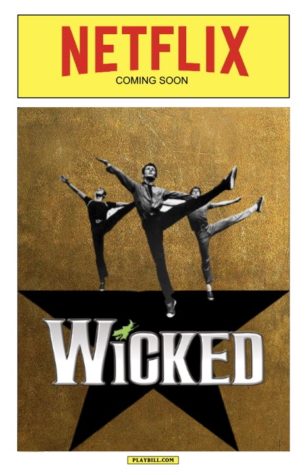OPINION: Musical theatre needs to remember its community as it takes Hollywood
December 1, 2021

“Hamilton,” “In the Heights,” “West Side Story,” “Wicked” and “Tick Tick… Boom!” The common ground between these phrases: they are only a few of the musical productions shining on the big and small screens lately.
Kicked off by the whirlwind that was the pro-shot “Hamilton: An American Musical” in the summer of 2020, movie musicals are having their moment right now.
As this market expands, however, and these musicals become much more widely interpreted, the industry needs to not leave its community behind.
The desire to gain accessibility and viewership for these shows has overshadowed remembering the roots and community in which they originated.
Rather than looking to the most notable A-list actress or actor, these movie musical adaptations can and should be a vehicle to bridge the gap between theater and film by casting individuals who have backgrounds in theater.
“It seems that producers or investors of these films are worried that the audience won’t come unless there’s name recognition in the cast, but sometimes, the art then suffers. Casting should serve the story first, and honor the material first, before going for a star name,” film critic Ryan Jay said.
Through casting already known names, directors are provided a safety net, but at the same time are further limiting artist expansion in an already difficult field. “Dear Evan Hansen” was highly criticized for several reasons, with one of its flaws being its casting of Amy Adams, Julianne Moore and Ben Platt, who originated the titular role on Broadway.
Much backlash came from the theatre community throughout the entire rollout of the film but largely over Platt’s age and statement defending his role, “ … There was never any kind of discussion that it wouldn’t be me.”
Being that the role of Evan in “Dear Evan Hansen” has been played by several other young thespians since Platt’s last show in 2016, many questioned why a younger Evan who fit the characteristics wasn’t chosen over Platt.
This outrage following the casting of this adaptation along with the star-studded “Cats” of 2019 stems from the same critical point that it does no good to these stories to be cheapened by hiring the largest name possible to carry profits. To juxtapose these films with ones such as “West Side Story” and “In the Heights” who are using their platform to grow the careers of smaller artists, there is a tangible difference in the way each cast either regresses or advances the story.
“A lot of stage actors are qualified both screen acting-wise and they have the voices to perform these roles on stage and on screen. So, I feel like it [musical adaptations] could give somebody, who may not be super well known outside of the theater-sphere, an opportunity to become a household name,” freshman theatre major Madison Bell said.
Steven Spielberg’s “West Side Story” stars Rachel Zegler and does exactly what Bell calls for. Discovered through an open casting call, Zegler had only been in smaller theater productions prior to this role — that and recording covers for Youtube.
“Wicked,” arguably the most anticipated and awaited adaptation of the past few years, has recently found its cast in Cynthia Erivo and Ariana Grande. This film is turning the game on its head with its casting of two stars who are not only high list celebrities in their own right but also have the Broadway background these musicals need.
“Wicked” does the task of bridging that divide between theater and film perfectly due to the fact that both Cynthia Erivo and Ariana Grande began their careers on Broadway.
The fan devotion to this show has been at such a high level for years, from Broadway to off-Broadway productions. If this trend and love for this show is only to increase with the release of the film, the industry can be hopeful that future productions will take notes from these casting choices and employ them as well.
As good as it is that these beloved shows are being able to be seen under a different light, the industry needs to not let this opportunity for the growth of artists pass. Future musical adaptations searching for their stars should look first to the community of highly-talented thespians waiting to shine under the limelight.








Leave a Comment